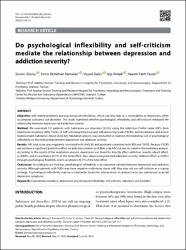| dc.contributor.author | Ulusoy, Sevinç | |
| dc.contributor.author | Ramakan, Enver Denizhan | |
| dc.contributor.author | Güleç, Veysel | |
| dc.contributor.author | Alnıak, İzgi | |
| dc.contributor.author | Yavuz, Kaasım Fatih | |
| dc.date.accessioned | 2022-07-06T06:37:35Z | |
| dc.date.available | 2022-07-06T06:37:35Z | |
| dc.date.issued | 2022 | en_US |
| dc.identifier.citation | Ulusoy, S., Ramakan, E. D., Güleç, V., Alnıak, İ. ve Yavuz, K. F. (2022). Do psychological inflexibility and self-criticism mediate the relationship between depression and addiction severity? Journal of Psychiatry and Neurological Sciences, 35(2), 130-137. http://doi.org/10.14744/DAJPNS.2022.00184 | en_US |
| dc.identifier.issn | 1018-8681 | |
| dc.identifier.issn | 1309-5749 | |
| dc.identifier.uri | http://doi.org/10.14744/DAJPNS.2022.00184 | |
| dc.identifier.uri | https://hdl.handle.net/20.500.12511/9564 | |
| dc.description.abstract | Objective: Self-related problems and psychological inflexibility, which can also lead to a vulnerability to depression, often accompany substance use disorders. This study examined whether psychological inflexibility and self-criticism mediated the relationship between depression and addiction severity.
Method: We examined 111 patients with Substance use disorders (SUDs) using the Addiction Profile Index (API), Beck Depression Inventory (BDI), Forms of Self-criticizing/Attacking and Self-reassuring Scale (FSCRS), and Acceptance and Action Questionnaire-Substance Abuse (AAQ-SA). Mediation analysis was conducted to examine the mediating role of psychological inflexibility on the relationship between depression and addiction severity.
Results: API total score was negatively correlated with AAQ-SA and positively correlated with BDI and FSCRS. Because FSCRS did not have a significant predictive effect on addiction severity (p=0.966), only AAQ-SA was included in the mediation analysis. According to the results of the mediation analysis, depression was found to directly affect addiction severity (direct effect, p=0.007), and it constitutes 54.5% of the total effect. Also, depression predicted addiction severity (indirect effect, p<0.001) through psychological flexibility, and it constitutes 45.5% of the total effect.
Conclusion: According to our findings, psychological inflexibility is an important variable between depression and addiction severity. Although patients with SUDs may have negative evaluations about self, they may not use self-criticism as a coping strategy. Psychological inflexibility may be a substantial target for interventions in patients who use substances to avoid depressive symptoms. | en_US |
| dc.language.iso | eng | en_US |
| dc.publisher | Kare Publishing | en_US |
| dc.rights | info:eu-repo/semantics/openAccess | en_US |
| dc.subject | Experiential Avoidance | en_US |
| dc.subject | Depression | en_US |
| dc.subject | Psychological Inflexibility | en_US |
| dc.subject | Self-Criticism | en_US |
| dc.subject | Substance Use Disorders | en_US |
| dc.title | Do psychological inflexibility and self-criticism mediate the relationship between depression and addiction severity? | en_US |
| dc.type | article | en_US |
| dc.relation.ispartof | Journal of Psychiatry and Neurological Sciences | en_US |
| dc.department | İstanbul Medipol Üniversitesi, İnsan ve Toplum Bilimleri Fakültesi, Psikoloji Bölümü | en_US |
| dc.authorid | 0000-0003-3862-2705 | en_US |
| dc.identifier.volume | 35 | en_US |
| dc.identifier.issue | 2 | en_US |
| dc.identifier.startpage | 130 | en_US |
| dc.identifier.endpage | 137 | en_US |
| dc.relation.publicationcategory | Makale - Uluslararası Hakemli Dergi - Kurum Öğretim Elemanı | en_US |
| dc.identifier.doi | 10.14744/DAJPNS.2022.00184 | en_US |
| dc.institutionauthor | Yavuz, Kaasım Fatih | |
| dc.identifier.wos | 000813492000009 | en_US |
| dc.identifier.scopus | 2-s2.0-85140463142 | en_US |
| dc.identifier.trdizinid | 1136979 | en_US |


















